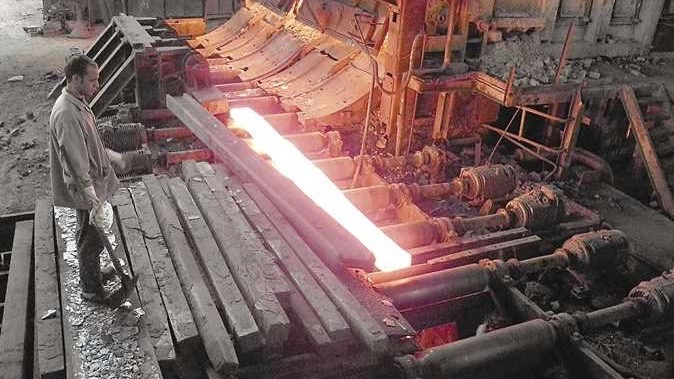Hundreds of workers of the Egyptian Iron and Steel Company took part in demonstrations on Sunday, as the management took some more measures towards its liquidation by stopping production at its plants, independent news outlet Mada Masr reported on Monday, May 31. According to the trade union committee of the organization, close to 500 workers who were protesting were confronted by Egyptian police who used excessive force against them and tried to chase them away from the protest site at the main gate of the company’s headquarters. 10 workers were detained for two hours before being released.
In addition to closing the company’s plants and stopping production, the management also abruptly announced on Sunday that a party would be appointed to launch the liquidation process on Monday. The heads of the company’s various departments were informed of this decision, and they verbally relayed the decisions to the workers. The management board had also told the bus drivers who regularly transport workers to stop bringing them to the company’s headquarters in Helwan. Mada Masr reported that due to the sudden nature of this announcement, the spontaneous protest had fewer participants than the one in January when around 4,000 workers organized sit-ins against the decision to liquidate the company.
The general coordinator of the Center of Trade Unions and Workers Services, Kamal Abbas, accused the management of announcing this decision at short notice to prevent the workers and unions from organizing a large strike. In a statement, Abbas noted that “what happened yesterday stripped the committee of its most important weapon.” He added that the trade union’s bargaining power rests with “the workers being present within the company’s walls, which could mean a permanent strike.” According to Abbas, halting production and preventing workers from entering the company’s premises also disrupts and weakens the committee’s efforts to hold talks over the compensation that should be given to the workers.
The decision on Sunday comes even as the talks continue between the government of president Abdel Fattah el-Sisi and workers’ representatives on a severance package for the close to 8,000 workers. Among the issues being negotiated are monthly payments, end-of-service compensation, and health insurance benefits. At the moment, the workers have been offered an extremely minimal rate of compensation by the Egyptian Public Enterprise ministry, at around 250,000 Egyptian pounds (LE) (USD 15,960), which is slightly more than the LE 225,000 that was previously offered. The maximum compensation rate, based on tenure, performance and other factors, has been set at LE 450,000.
This offer was agreed upon by the Labour Force ministry and the General Union of Engineering, Metal and Electrical Workers, the trade union committee’s national parent union, but the company’s workers refused the offer. Abbas said, “The new offer does not include any contribution from the state to support the fellowship fund to ensure that all workers get all their financial rights, but rather proposes dividing the current resources of the fund between the workers in accordance with their years of experience and size of contributions.”
As a result, in a closely related separate protest staged earlier on the same day, hours before the production was halted and plants were closed, roughly 1,200 workers demanded that the workers be paid a compensation worth a minimum of LE400,000 and a maximum of LE700,000, in line with the demands of the trade union committee. The government has reportedly offered a monthly stipend of LE 1200 per month for workers who have worked at the company for over 25 years until they reach the age of 60, following which, they will be given a pension. The trade union committee has demanded that this be increased to LE 2000 per month
The decision in January to liquidate the 77-year old Egyptian company led to intense anger from all sectors of society. The company has been incurring losses for the past several years and had also accumulated substantial public debt for the government during that time. It was one of the largest employers in Egypt with around 14,000. Reports indicate that after the proposed liquidation and overhaul, the new mining and quarrying company that will come up in its place will employ only 400 workers. Several other large public sector companies have also been liquidated in the recent past, such as the National Cement Company and the Egyptian Navigation Company, while many others have also been targeted for partial or full privatization.





